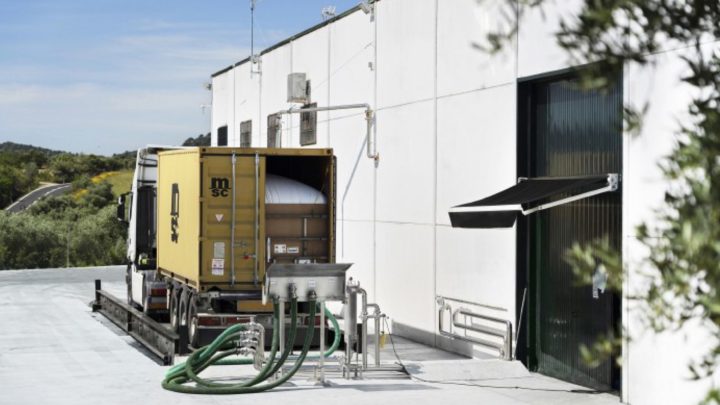
Switzerland-based container shipping giant MSC said in June it had become the first carrier to provide “in-house Liquid Cargo Solutions”, directly supplying and fitting flexibags for customers. The carrier provides a single point of contact, offering end-to-end services for customers in the liquid cargo supply chain.
MSC employees fit selected flexibags at its depots prior to cargo pick-up, which removes the requirement for haulage to third-party fitting locations. MSC Liquid Cargo Solutions is already available at depot facilities in Europe, Asia, the Middle East and the Americas.
However, it is some of the sustainability claims in MSC’s announcement that drew criticism from ITCO. On behalf of ITCO’s members, the organisation’s president Reg Lee states ITCO wants to correct a number of “misconceptions which could potentially arise from this publicity”.
Flexibags “neither eco-friendly nor sustainable”
Flexibags – the term ITCO uses instead of flexitanks – are “neither eco-friendly nor sustainable”, the statement maintains. “A flexibag is made of plastic films consisting of polyethylene and a polypropylene sleeve; it weighs more than 40kg and will probably end up in a landfill rubbish site. Each flexibag is equivalent to over 7,500 single-use shopping bags,” Lee states.
This is in contrast to a tank container, which can transport cargo multiple times each year, over a life-cycle that can surpass a 20-year service life. At the end of its serviceable existence, approximately 90 percent of the tank can be recycled through long-standing metal recovery services, ITCO states.
Moreover, ‘flexibags’ are not fully recyclable, Lee goes on. “After use, the flexibag has limited possibility for recycling, because it is made of thin 0.25mm films of polyethylene – unlike rigid plastics items which are made into new plastics by established processes. Soft plastics films are not easily – or economically – recyclable, and the majority will end up dumped in landfill, most probably in a cargo contaminated state, which further endangers the environment.”
Misleading information
One statement that seems to rile ITCO in particular is that there is “no need to clean the container after use, as with ISO tanks”. Lee says this is misleading and incorrect. “While a flexibag which has carried wine might possibly be safe for shredding and re-processing in an empty-dirty state, any flexibag which had been carrying chemical or petroleum products must also need to be thoroughly drained and cleaned for safety of handling, prior to being sent to landfill or incineration. Conversely, the controlled and monitored cleaning of tank containers allows them to safely carry high quality goods repeatedly,” he states.
Another statement, that flexibags comprise “less packaging than conventional ISOtanks” is false, ITCO says. Tank containers are, themselves, the packaging for transport and no additional materials are required. “Flexibags, on the other hand, must have liners made of varying materials for the dry box, bulkheads, and potentially heating pads – in addition to the single-use multi-layered flexibag itself.”
The full cost of packaging and recycling a flexibag, Lee argues, is rarely taken into full consideration by shippers, as it is usually the full responsibility of the consignees or receivers to voluntarily recycle the flexibags or dispose of the dirty flexibags in landfills. “Few processes or laws are in effect to trace the flexibags from cradle to grave, and waste is not controlled as it is in tank containers,” he states.
Supply chain
The responsibility for the environmental stewardship of the bag is lost along the supply chain, without traceability, ITCO asserts. “The shipper, who purchases and introduces the 40kg of plastic into the world, has no responsibility for what subsequently happens to it upon delivery. This is entirely different to a tank container shipment, where the tank container operator retains responsibility for the environmental stewardship of the tank container – and of its cargo residue and of its cleaning. The operator accepts full responsibility right through the supply chain, and welcomes auditing at every stage.”
Other hazards with flexitanks include a confined space perspective as destination handlers all over the world need to remove contaminated flexibags from the container and place in a skip for disposal. Lack of procedures and controls globally could put workers at risk; “unlike tank containers, where audited safety procedures minimise and control the risk to workers”.
ITCO also emphasises that the carriage of bulk liquid cargoes by road requires special driver training because of the risks associated with the surge movement of liquids inside the containers. Specialist tank container trucking companies carry out extensive training to educate their drivers about the danger of liquid surge inside the tank container and the effect this has on the stability of the vehicle. “There is generally no such training among conventional dry-box trucking companies used to transport flexibags, making the transport potentially unsafe,” the statement continues.
Lee asserts that a tank container remains the safest and most environmentally acceptable method of containerised bulk liquid transport. Every 40kg plastic flexibag that is manufactured represents a needless addition to the burden of plastics in the global environment, because the same liquid cargo could be repeatedly carried instead by tank container.
